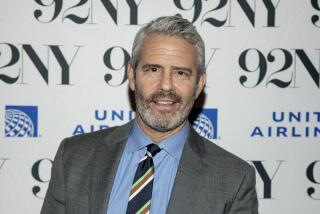Doctor’s specialty is CBS’ ‘Survivor’
- Share via
Have you ever suspected that contestants on “Survivor” have behind-the-scenes help in their efforts to survive?
You’re right. They do.
But once you know the kinds of beasts, bugs and diseases that the nearly naked contestants are up against, you won’t grudge them the assistance of the medical team led by Dr. Adrian Cohen, the physician who’s been at the scene of every edition of “Survivor” since the show debuted in 2000. The ninth edition debuted Thursday on CBS.
“I call what I do pre-hospital medicine,” says Cohen, a 43-year-old Australian who got his start in what’s also called “adventure medicine” by volunteering with Sydney’s helicopter rescue team. Soon he was leading the medical teams that treated the racers on Mark Burnett’s “Eco-Challenge” program, which led to work on the reality kingpin’s signature show, “Survivor.”
“For some doctors, [adventure medicine] is very forbidding, because they’re used to working in a nice, well-lit, well-ventilated, 24-7 environment, where there’s radiology down the hall and the [operating room] upstairs and the pathology lab on call, and their friends and colleagues are at the end of a phone line,” Cohen says.
By contrast, Cohen and his “Survivor” team (an additional doctor, three paramedics and three nurses) have no power except what’s supplied by generators, and only the supplies they lug into the field -- or jungle, as the case may be.
“We’ve been all over the world, but the one thing that’s consistent is that we’re in the middle of nowhere,” says Cohen, whose team treats not only the “Survivor” contestants but also the program’s 350-person crew.
And as viewers of the show know, it’s not all fun and games for the “Survivor” contestants. Jeff Probst, the host of the show, was bitten by a scorpion when the show was filmed in Africa, and was stung by a jellyfish during the first edition in Borneo.
The keys to making sure the contestants go home healthy, Cohen says, is putting each one through intense mental and physical screenings before they leave; those medical reports give physicians a baseline to work from if anything goes wrong. And if something does go wrong, the “Survivor” medical team has a plan -- and on-call helicopters -- in place.
Cohen’s longtime fasciation with trauma cases led to his early work as a helicopter rescue doctor and to the writing of several books about neck safety and emergency medicine; the doctor also founded an Australian firm called Immediate Assistants, a 50-person company that provides on-call medical assistance to various sporting events and corporate events, as well as films and television shows.
But Cohen’s main gig several months a year is with “Survivor,” where he and the producers try not to let minor ailments get in the way of the casting process.
“We don’t like to discriminate against people on the basis of [medical conditions],” Cohen notes. “The key is, are they stable? Somebody who was diabetic to the extent that their sugars had to be constantly monitored every day and would fluctuate wildly is going to have a hard time existing in that environment.” But contestants with stable, treatable conditions are allowed to bring their medication (it’s not considered a “luxury item”), which they take off camera.
More to Read
The complete guide to home viewing
Get Screen Gab for everything about the TV shows and streaming movies everyone’s talking about.
You may occasionally receive promotional content from the Los Angeles Times.






